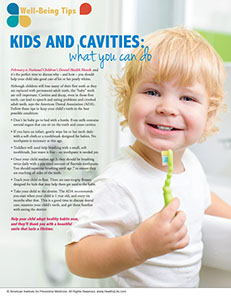SYMPTOM CHECKER
CONDITIONS
Male
Female
Child
Arm, Hand & Shoulder Concerns
Legs & Feet Concerns
Dental & Mouth Concerns
Ear & Nose
Eye Conditions
Head Conditions
Arm, Hand & Shoulder Concerns
Legs & Feet Concerns
Front
Back
Arm, Hand & Shoulder Concerns
Dental & Mouth Concerns
Ear & Nose
Eye Conditions
Head Conditions
Arm, Hand & Shoulder Concerns
Dental & Mouth Concerns
Ear & Nose
Eye Conditions
Head Conditions
Front
Back
Arm, Hand & Shoulder Concerns
Neck Links
Head & Neck Concerns
Arm, Hand & Shoulder Concerns
Neck Links
Head & Neck Concerns
Front
Back
Online Clinic
Wise Healthcare
Kids and cavities: What you can do
Print on Demand
Although children will lose many of their first teeth as they are replaced with permanent adult teeth, the “baby” teeth are still important. Cavities and decay, even in those first teeth, can lead to speech and eating problems and crooked adult teeth, says the American Dental Association (ADA). Follow these tips to keep your child’s teeth in the best possible condition:
• Don’t let baby go to bed with a bottle. Even milk contains natural sugars that can sit on the teeth and cause cavities.
• If you have an infant, gently wipe his or her teeth daily with a soft cloth or a toothbrush designed for babies. No toothpaste is necessary at this age.
• Toddlers will need help brushing with a small, soft toothbrush. Just water is fine – no toothpaste is needed yet.
• Once your child reaches age 3, they should be brushing twice daily with a pea-sized amount of fluoride toothpaste. You should supervise brushing until age 7 to ensure they are reaching all sides of the teeth.
• Teach your child to floss. There are easy-to-grip flossers designed for kids that may help them get used to the habit.
• Take your child to the dentist. The ADA recommends you start when your child is 1 year old, and every six months after that. This is a good time to discuss dental care, examine your child’s teeth, and get them familiar with seeing the dentist.
Help your child adopt healthy habits now, and they’ll thank you with a beautiful smile that lasts a lifetime.
This website is not meant to substitute for expert medical advice or treatment. Follow your doctor’s or health care provider’s advice if it differs from what is given in this guide.
The American Institute for Preventive Medicine (AIPM) is not responsible for the availability or content of external sites, nor does AIPM endorse them. Also, it is the responsibility of the user to examine the copyright and licensing restrictions of external pages and to secure all necessary permission.
The content on this website is proprietary. You may not modify, copy, reproduce, republish, upload, post, transmit, or distribute, in any manner, the material on the website without the written permission of AIPM.
2021 © American Institute for Preventive Medicine - All Rights Reserved. Disclaimer | www.HealthyLife.com
















































